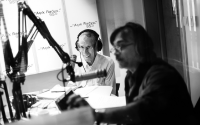Common Dreams / Published on Wednesday, January 21, 2004 by OneWorld.net
On the eve of this year's World Economic Forum (WEF), the annual get-together of global business and government movers and shakers in Davos, Switzerland, a major environmental group is calling on the meeting to open its doors to public scrutiny.
Friends of the Earth International (FoEI) charged that both the guest list and the private agenda have been kept secret by WEF's organizers although most of the issues taken up in conference rooms at the exclusive ski resort--including plans to resume international trade negotiations that broke down last September at a World Trade Organization (WTO) meeting in Cancun, Mexico--affect hundreds of millions of people around the world.
It said the WEF's secrecy constituted a threat to democracy.
While the WEF claims to act in the public interest, said Tony Juniper, FoEI's vice chairman, "behind closed doors and the WEF's public-relations gloss, there is a different reality."
The theme of this year's meeting, in which more than 2,000 representatives from the world's biggest companies are expected to participate, is "Partnering for Security and Prosperity," a subject that will be highlighted in WEF's ''Open Forum," that runs parallel to the confidential talks.
This year's WEF, which runs from Wednesday through Saturday, is taking place on the heels of the World Social Forum (WSF), an annual convention of representatives of thousands of non-governmental organizations (NGOs) which, in contrast to the Davos-based group, have taken a generally skeptical--if not confrontational--view of corporate-led economic globalization.
The WSF, which until this year met in Porto Alegre, Brazil, drew between 50,000 and 80,000 participants from some 132 countries to discuss a range of issues, such as trade, debt, labor, foreign investment, and the impact of the U.S.-led "war on terrorism" on freedoms and development in poor countries.
Unlike the WEF, all WSF discussions are open to the public and media coverage.
Many of the WSF's featured speakers this year cautioned their audience against assurances by the Davos group that opening economies to foreign corporate investment will ensure future prosperity.
"Foreign investment enters a country and produces an economic boom," noted Joseph Stiglitz, a former World Bank chief economist currently at Columbia University. "But soon the investment moves out, leaving the country with worsened economic and political conditions."
Similarly, Amnesty International's Secretary General, Irene Khan, addressing the Mumbai meeting, appeared to address the WEF, as well, when she called for corporations to support binding international treaties that will require them to uphold human rights in their operations. Amnesty will also be participating directly at the WEF conference, which has invited prominent NGOs to some of its discussions.
"Economic globalization has expanded the reach of corporate power, and it is more urgent than ever that companies be brought within the rule of human rights law," she said. "Voluntary initiatives by themselves are not enough-voluntary approaches only work for the well-intentioned. The historical reality is that some form of legal framework is necessary to restrain abuses."
FoEI echoed that message with respect to the environment. "It is time big business was held to account," said Juniper. "We need global regulations to ensure that companies do not put profit above the needs of the environment and local communities," he said.
Such messages are unlikely to be well-received by WEF members, who have long promoted the use of voluntary initiatives to encourage corporations to respect human rights and environmental norms.
NGOs are particularly concerned that this year's back-room meetings will focus more, however, on how to revive the WTO trade negotiations than on corporate accountability to the global public and the environment.
"When business leaders claim to be acting in the interests of security and prosperity," said Juniper, "they mean security to protect the prosperity of the multinational companies who rule the world rather than the greater peace and security of the world."
CEOs still claim that what is good for large corporations is good for society, but world leaders should face up to the fact that this is not the case," noted Nur Hidayati, the head of Friends of the Earth in Indonesia.
Indeed, a poll of some 43,000 people that was commissioned by the WEF and carried out by the Gallup organization found that most ordinary people around the world feel "unsafe, powerless and gloomy" about the future and their own economic situation compared to a decade ago, when global economic integration was not nearly so advanced.
In one remarkable finding, the survey found that most people in the 52 countries that were polled "felt they have little or no personal impact on the economic, political and social factors that affect daily life..."
A second report released last week by the WEF's Global Governance Initiative also found that the world was failing to meet minimum goals set forth by the United Nations at its Millennium Summit in 2000 to reduce global poverty and promote the health and education of the world's poor.
"The WEF is keen to show that it is acting for the greater good, but even their own reports expose the reality," said Juniper who called for the business leaders to squarely confront their own responsibility for the widespread gloom, deteriorating environmental conditions, and the failure to address to the plight of the more than one billion people who live in poverty.
The WEF said more than 30 heads of state or government, including Jordan's King Abdullah, Polish President Aleksander Kwasniewski; Argentine President President Nestor Kirchner; Nigerian President Olusegun Obasanjo; Pakistan President Pervez Musharraf; Canadian Prime Minister Paul Martin; and Turkish Prime Minister Recep Tayyip Erdogan, are scheduled to participate, as well as former President Bill Clinton, top European Union (EU) officials, and UN Secretary General Kofi Annan.
Vice President Dick Cheney, on a rare trip outside the United States, will lead the U.S. delegation, which will also include Attorney General John Ashcroft.
At least half of the participants will be business leaders, including the CEOs or chairpersons of some 800 leading companies according to WEF's organizers, who said some 18 union leaders and representatives of 54 NGOs will also be taking part.






